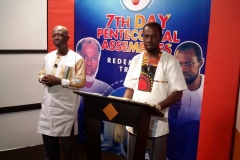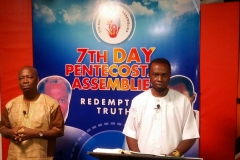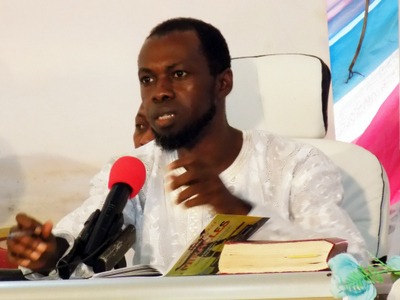In Him is Yes
By Elder Enoch Ofori Jnr
(Sabbath Sermon, Nov. 17, 2012)
“Whom do men say I am?”
Uncertainty can be a robber of blessings. Uncertainty about the efficacy of a drug may make you reluctant to use it, although it could bring quick relief to your headache. Similarly, uncertainty about the credibility of a friend may deprive you of an excellent business partner, even though he possesses business acumen and sound moral character.
Uncertainty never helps a cause. What’s best is to know all the facts about a situation or person you are involved with so you can make sound judgment based on conviction. If not hesitancy, uncertainty can beget costly mistakes. So it’s always important to be sure and to proceed on that basis.
Nearing the end of His three- and-half- year ministry the Lord Jesus startled His disciples with a question:
“When Jesus came into the coasts of Caesarea Philippi, He asked his disciples, saying, ‘Whom do men say that I the Son of man am?’
“And they said, ‘Some say that Thou art John the Baptist: some, Elias; and others, Jeremias, or one of the prophets’.
“He saith unto them, ‘But whom say ye that I am?’
“And Simon Peter answered and said, ‘Thou art the Christ, the Son of the living God’.
“And Jesus answered and said unto him, ‘Blessed art thou, Simon Barjona: for flesh and blood hath not revealed it unto thee, but My Father which is in heaven'” (Matt. 16:13-17).
The Lord Jesus was not easily definable. He was kind of enigmatic to people, and they generally held Him to be some sort of prophet or very likely John the Baptist come back to life! That was the opinion out there. There was some vagueness about His personality, and arguably the people outside His inner circle were entitled to that. But soon He directed the question at His inner circle: “But who do you say I am?”
I am sure some were scratching their heads as to how to answer the Lord. He was close to them as their Rabbi, and they were eyewitnesses of His miraculous works and teachings. But as to Who He really was! A deafening silence greeted the Master for a while after He posed the question. Who really was Master Yeshua! If not a prophet, what else? For even His disciples, the fog of mystery about Him had not been lifted.
He was larger than life – a miracle worker who raises the dead and walks on the sea – yet He was very human. They had seen Him eat and drink, even ate with Him. Like the average human, He had felt the pangs of hunger and thirst and a wearied body. But He was obviously more than human in His words and deeds. It was not easy to place Him.
Peter saved the situation that day. He successfully divulged the true identity of the Master. Yeshua was the Christ, the Anointed of God. But this was a discovery that could not be made by ordinary means–judging from social background facts, from family background facts and even from empirical observation of the daily routine of His life. It was beyond human scope to unravel who Jesus was except God the Father intervened to do the revelation.
The question “Who do you say I am” is as relevant today as when Jesus asked it of his followers years ago. The answer you give must come from a personal conviction impressed on your mind by the Spirit of God. You should be able to know and understand the Lord whom you have believed from the depth of your being. Such was the apostle Paul. He was clear and unshakeable in his mind as to the God he followed and proclaimed when he wrote to the Corinthians:
“But as God is true, our word toward you was not yea and nay.
“For the Son of God, Jesus Christ, who was preached among you by us, even by me and Silvanus and Timotheus, was not yea and nay, but in Him was yea.
“For all the promises of God in Him are yea, and in Him Amen, unto the glory of God by us” (2 Cor. 1:18-20).
Let’s hear him out again: ‘In Christ Jesus, the Son of God, is “Yes”, that is, affirmation, and that without a shred of inconsistency. And the underlying reason is that both God and His word are true. For this reason, “all the promises of God” are “Yes and Amen” in Christ – who is the Word preached to us.
Halleluiah! Christ, the divine “Yes” Personality, in whom every promise of God is guaranteed to us, is not far away from us; He’s daily preached to us! So what is your need? What is your fear? If you have Christ, the promises of God are no longer a promise but a reality!
But you must have that confidence and depth of feeling Paul had that God is faithful and that Jesus is His assurance that His promises never fail. You must both believe and experience the faithfulness of God.
Prove it yourself
The faithfulness of God is not simply a psychological balm we invoke to console ourselves when we are emotionally broken or the going gets tough. It’s real and those who believe it surely testify of it. David spent a lifetime studying the faithfulness of God, and he was not disappointed. He states in Ps 37:25: “I have been young, and now am old, yet I have not seen the righteous forsaken or his children begging for bread” (ESV).
So then, Apostle Paul was not merely parroting an axiom when he asserted that “God is faithful”. It was a conclusion shaped by particular circumstances of his life and a diligent study of the word.
It took him more than hearing Christ regularly preached in church!
He searched it out himself through a personal study of the scriptures and came to the realization that God never failed to keep faith with all those who put their trust in Him. You name them: Abraham, Isaac, Moses, and David and the Prophets; He was faithful to all. The outcomes of their lives of faith showcased the faithfulness of God in all its magnificence and richness. To barren aged Sarah He gave the blessed child of promise, Isaac; in the dark dungeons of Pharaoh’s prison His grace shone on prisoner Joseph and he became governor of Egypt in fulfilment of His promise. To Daniel in the lion’s den He sent an angel with a special gag order: shut the mouths of the hungry lions! However dire the circumstances, the promises of God would not be stopped as to call into question His faithfulness.
Faithfulness is essential to God’s nature; it’s at the heart of His being:
“Know therefore that the LORD thy God, He is God, the faithful God, which keepeth covenant and mercy with them that love Him and keep His commandments to a thousand generations” (Deut. 7:9).
Disappointment is not in His lexicon. He always proves faithful to those who wait upon Him, the saints of old being a classic example: “They looked unto Him, and were lightened: and their faces were not ashamed” (Ps 34:5).
But the apostle also came to be convinced of the faithfulness of God in an entirely different way. Not by reading the stories of some old saints far removed from his time, but by experiencing the faithfulness of God in his own life. Formerly a “chief sinner”, the Lord, who foreknew him, called him and turned his sorry life around. Though he was totally unworthy of it, the Lord made him an apostle and put him in the ministry to proclaim His gospel of salvation. And He made available to him His grace in abundance (1 Tim. 1:12-15).
This was the faithfulness of God in action, His faithfulness being executed in the life of Paul. But He had begun with a promise when He called him fresh out of his wayward ways as a persecutor and violent man in the Damascus road encounter. Recounting the encounter before King Agrippa, Paul recalled the Lord telling him:
“But rise, and stand upon thy feet: for I have appeared unto thee for this purpose, to make thee a minister and a witness both of these things which thou hast seen, and of those things in the which I will appear unto thee;
“Delivering thee from the people, and from the Gentiles, unto whom now I send thee,
“To open their eyes, and to turn them from darkness to light, and from the power of Satan unto God, that they may receive forgiveness of sins, and inheritance among them which are sanctified by faith that is in Me” (Acts 26:16-18).
That divine word of promise did not fail to materialize in the life of the apostle. In 1 Cor. 15 he testified:
“I am the least of the apostles, that am not meet to be called an apostle, because I persecuted the church of God.
“But by the grace of God I am what I am: and His grace which was bestowed upon me was not in vain; but I laboured more abundantly than they all: yet not I, but the grace of God which was with me” (vv. 9-10).
He had personally experienced the faithfulness of God; he had seen it at work in his life; he was a living testimony to it, and he had no doubt in his mind at all as he wrote to encourage the church in Thessalonica: “Faithful is He that calleth you, who also will do it” (1 Thess. 5:24). A while later, he wrote to the same church, “But the Lord is faithful, who shall stablish you, and keep you from evil” (2 Thess. 3:3).
Towards the end of his life, while shackled in prison under a death sentence soon to be executed, he declared joyfully and confidently to Timothy: “For the which cause I also suffer these things: nevertheless I am not ashamed: for I know whom I have believed, and am persuaded that He is able to keep that which I have committed unto Him against that day” (2 Tim. 1:12).
He knew Him to be faithful to him even in death, cruel death by Caesar’s sword. As indeed Psalmist says, “… this God is our God for ever and ever: He will be our guide even unto death” (Ps 48:14).
That was then and that was Paul. What about you? Since you claim to follow the same God Paul followed, can you confidently repeat after him that “I know whom I have believed” and I am persuaded He will fulfill His promises to me? What have you learnt from the scriptures about God? Has He proven faithful in your own life when times were tough and disaster seemed inevitable?
Jesus Christ, the Father’s “Yes” Answer to every Need!
If your God is the same God Paul believed and you have faithfully followed Him as he did, the answer to the above questions should be yes! The “Yes” Personality from heaven who brooks no impossibility is daily preached to you and you read about Him. It’s time to experience His faithfulness in your personal life and circumstances so you can say with all confidence from the depth of your soul, ‘God is true’!
You need not entertain a flicker of doubt! Jesus is the Father’s “Yes” for every promise He ever made to you–the “Yes” for every need and every hope you ever cherished. He’s your ‘yes’ for sound health, your ‘yes’ for prosperity, your ‘yes’ for salvation and victory in all spheres of life. The Father made Him the guarantee of all His promises because He knows He’s capable of fulfilling your every hope and need. He is “the power and wisdom of God” (1 Cor. 1:24).
In His earthly life all opposition melted before Him; no devil triumphed, no circumstance overwhelmed Him. Evil spirits cried out in His presence and left their victims, the dead came back to life, the hungry were fed in their thousands with five loaves of bread and two fish. Needs of all sorts were met, and thousands cheered and chorused in utter amazement: “… He hath done all things well: He maketh both the deaf to hear, and the dumb to speak” (Mark 7:37).
This Man, this Divine Personage, this Son of the Highest, is Heaven’s answer to all your worries and problems. He’s more than capable. Even if on earth nothing was impossible unto Him, what about today when He’s seated on the right hand of Power with “all authority on earth and in heaven” given to Him by the Father?
What is impossible is not the fulfilment of His promises but failure and disappointment. Christ is at variance with failure; it cannot happen whilst He’s the Lord of your life and you are His humble servant. If you think failure, it’s all in your mind. When the Father made Him the “Yes” answer to all your needs, He did not leave room, not even a crevice, for disappointment to sneak in. “All the promises of God find their Yes in him. That is why it is through Him that we utter our Amen to God for His glory” (ESV).
Let’s not belie our prayer. The “Amen” we utter in prayer has huge spiritual significance. The “Amen” is glory we give to God for granting us His promises through Christ. Once this is done, we have no reason to doubt again! It’s “Yes” in Christ all the way. And He will surely prove Himself so.
At this point, nobody will have to convince you any more. You will know personally and experientially. You will become a living testimony to God’s faithfulness. You will tell others, you will praise and extol Him for it, because now you have seen, felt and lived His Faithfulness. All to the glory of the Father through Christ Jesus, His Son. Amen!



